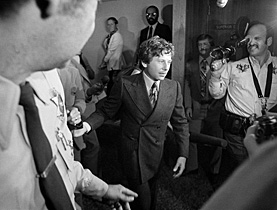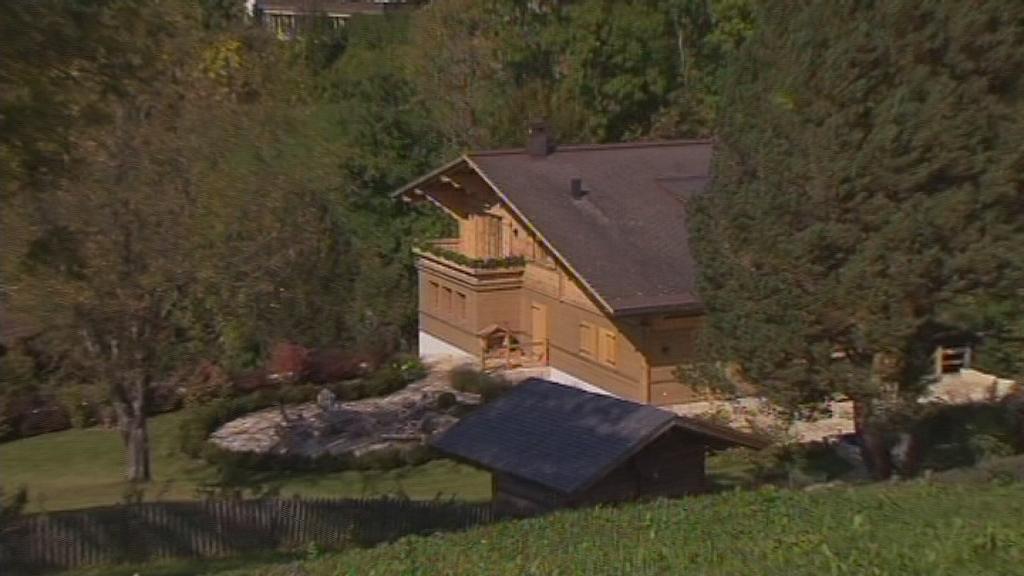Roman Polanski granted bail

The Swiss Federal Criminal Court has upheld film director Roman Polanski's appeal against detention pending extradition. Bail was set at SFr4.5 million ($4.5 million).
But Polanski will remain in jail in Zurich until the Federal Justice Office decides whether to file an appeal. It has ten days to do so.
On Wednesday evening Justice Minister Eveline Widmer-Schlumpf told Swiss television she saw no reason to appeal against the court’s decision.
In a statement, the court said it accepted Polanski’s offer to set bail at SFr4.5 million, together with other guarantees to ensure he does not leave the country.
These measures include the depositing of Polanski’s identity papers and placing him under house arrest using electronic monitoring at his holiday chalet in the mountain resort of Gstaad.
The court estimated that the SFr4.5 million is a substantial portion of the fortune of the renowned French-Polish director.
“The 76-year-old appellant is married and the father of two minors,” the court said, as it considered Polanski’s offer of a cash bail secured by his apartment in Paris. “It can be assumed that as a responsible father he will, especially in view of his advanced age, attach greater importance to the financial security of his family than a younger person.”
The court said Polanski would be subjected to “constant electronic surveillance” at his chalet and an alarm would be activated if he left the premises or took off the bracelet.
A Justice Office spokesman, Folco Galli, told swissinfo.ch that it would analyse the court’s verdict and decide “quickly” whether it would free Polanski or file an appeal. However, Galli said a decision would not be taken before Thursday.
Polanski’s lawyers Lorenz Erni in Zurich and Herve Temime in Paris declined to comment. The Los Angeles County district attorney’s office also had no reaction.
International warrant
Polanski was arrested on September 26 as he arrived in Zurich to be honoured at the city’s film festival.
He is wanted in the United States for having sex with a 13-year-old girl in 1977 in Los Angeles. He fled the US before sentencing.
The Swiss justice authorities said they acted in accordance with a mandate from the US, which provided Bern with the number of Polanski’s flight and its time of arrival in Switzerland.
A spokesman from the Swiss justice and police ministry said this was standard procedure.
Switzerland signed its current extradition treaty with the US in 1990. It has been in force since 1997. The treaty contractually binds both countries to apprehend anyone sought by the other.
An international warrant for the filmmaker’s arrest was issued in 2005 for the crime, which is not covered by the US statute of limitations.
US Officials were kept abreast of the fugitive director’s whereabouts over the years.
Why now?
When Polanski was detained at Zurich airport two months ago, questions were raised why Switzerland decided to go after him at that time, even though the director was a frequent visitor to the country.
The justice authorities responded that Switzerland was obliged by treaty to apprehend the director.
Galli said that this was the first time officials had precise details on the director’s arrival in Switzerland and an official American request to arrest him.
A court in California is to discuss the Polanski case on December 10.
“Cash is king”
Swiss legal experts had said earlier that Polanski’s chances of bail were slim, and even US authorities expressed confidence that a Swiss court wouldn’t grant his release.
In October the court rejected Polanski’s first bail offer of his Gstaad chalet as collateral, which the director claimed made up more than half of his personal wealth and would definitely guard against his flight because he has two children he must support through school.
This time, the court looked favorably on Polanski’s offer of cash and the threat of sacrificing his family’s home if he fled justice.
“Cash is king,” said Peter Cosandey, a former Zurich prosecutor. Still, he said he could “hardly remember a case where bail is granted to someone who isn’t even a full-time Swiss resident.”
swissinfo.ch
Feb. 3, 1978: Federal authorities confirm Polanski is living in France.
May 3, 1978: Provisional arrest request prepared when officials learn Polanski may be in England.
December 1986: Authorities talk to Canadian police after learning Polanski may be travelling there.
May 1988: Authorities receive notice Polanski may travel to Germany, Denmark, Sweden or Brazil. They confirm warrant is active but no arrest is made.
October 2005: The LA District Attorney’s Office tells Interpol Polanski will be in Thailand. He is not arrested.
July 10, 2007: Polanski goes to Israel, but Israelis want more details before making an arrest. By the time the information arrives, Polanski is gone.
Sept. 22, 2009: Swiss inform the US that Polanski is scheduled to appear at a film festival in Zurich. Americans draft a provisional arrest warrant that Swiss authorities execute a few days later.
Nov. 3, 2009: Polanski files a new bail appeal to be released from prison.
(Source: Los Angeles District Attorney’s Office)

In compliance with the JTI standards
More: SWI swissinfo.ch certified by the Journalism Trust Initiative




You can find an overview of ongoing debates with our journalists here. Please join us!
If you want to start a conversation about a topic raised in this article or want to report factual errors, email us at english@swissinfo.ch.